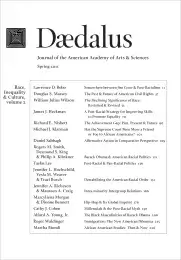A Post-Racial Strategy for Improving Skills to Promote Equality
Disparities between blacks and whites are persistent features of American society.11 On many measures, blacks as a group perform worse than whites, and the trends are discouraging. These disparities, continuing reminders of America’s troubled history of racial discrimination, clash with American ideals about equality, opportunity, and social mobility. Discussing these disparities is painful because American public policy has been so wrong in the past. The institution of slavery, the all-too-slow dismantling of segregation in the South and discriminatory practices elsewhere, prevented ready acceptance of blacks into mainstream American society. When the civil rights movement finally goaded the United States into abolishing state-sanctioned discrimination, integration of African Americans into the economy accelerated. Black economic status surged in the late 1960s and early 1970s, with especially rapid progress in the previously segregated South.2
The success of the civil rights movement in reversing state-sanctioned discrimination gave rise to the hope that active government intervention in the economy, schools, and the courts could produce full equality for blacks in the larger society. Some forty years later, despite the visible success of an elite group within the black population, the economic and social progress of a large segment of African Americans has lagged. If anything, official statistics overstate the progress of African American males.3. . .
